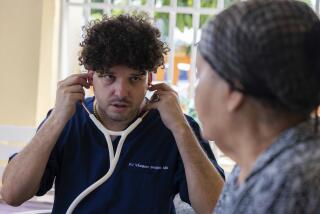A Mission of Mercy
Octavio Vallejo said his destiny hit him as he watched a young boy die of AIDS in a Mexico City hospital several years ago, without painkillers to ease the suffering. Vallejo, who was a doctor at a hospital that houses 65% of Mexico’s pediatric AIDS cases, said his young patients pushed him into his mission in life.
“It was so frustrating trying to help these children and their families with no resources,” he said.
So Vallejo came north to find solutions, and in the process emerged as a vital asset in Los Angeles’ AIDS community--a key link between traditionally white AIDS services and the growing number of HIV-infected Latinos.
As a research fellow at UCLA’s Center for Health Promotion and Disease Prevention, Vallejo has spent the last three years fighting HIV’s spread in the Latino community.
Los Angeles County health officials report that the number of new AIDS cases is increasing most rapidly among Latinos. In 1985, Latinos accounted for less than 20% of the total cases in the county, but that number jumped to nearly 40% by 1995, according to the county’s HIV epidemiology program.
Leaders in community AIDS organizations said Vallejo’s knowledge about treatment coupled with his perspective as a gay Latino help him make inroads in a community they fear is often cut off from information.
“Octavio is, to me, the key central figure in the [HIV-positive] Latino community,” said Nancy Geshke, director of client services at L.A. Shanti, an AIDS services organization. “Everybody knows him, and he knows everybody.”
Vallejo said he feels driven to eradicate stigmas about AIDS in the Latino community and to spread the news about emerging treatments.
“A lot of people are out of the picture in terms of new developments,” said Vallejo, 40. “There are a lot of myths regarding infections, and many still think there’s no possibility in terms of treatment.”
Vallejo’s days reflect the almost frantic pace of his efforts. During one typical week, he juggled running a support group for HIV-infected Latina mothers, editing a Spanish-language newsletter for people with AIDS and arranging an exhibit of Mexican art dealing with AIDS.
He also is a medical advisor to half a dozen community organizations and speaks regularly at national conferences on AIDS. And he just returned from headlining a four-day AIDS seminar at a Baja California university.
“I have a problem,” he admitted with a broad grin. “I can’t say no.”
*
Others have noticed. Last month, the city of West Hollywood presented its “Angels Amidst” award to Vallejo and nine others for diligent and often anonymous volunteer work.
As a Spanish-speaking doctor who specializes in AIDS, Vallejo was in demand as soon he appeared in the community. One of his first projects--developing peer education programs for Latino teenagers--led to invitations and requests from community groups.
At Bienestar, a Latino AIDS project, Vallejo trains volunteers and explains the latest breakthroughs in HIV treatments to clients. As a medical advisor at L.A. Shanti, Vallejo helps develop Vidas Positivas, weekend seminars for Latinos who have family members with AIDS.
“We have a problem among Latinos--they do not perceive help as a human right,” Vallejo said. “They perceive it as charity, and they also consider health care providers as authorities. They don’t seek health care and they do not negotiate for better care.”
Vallejo’s low-key approach and attitude make the daunting technicalities of the disease accessible, his colleagues said.
“He doesn’t speak like a physician with very elaborate terms,” said Luis Eduardo Morillo, prevention programs coordinator at Bienestar. “He has that very rare quality of speaking the language that our clients speak.”
Local AIDS service providers said Vallejo has helped them broaden prevention programs that typically target gay white men.
In the midst of his activities in Los Angeles, Vallejo said, he has not forgotten what brought him north. Vallejo and a UCLA colleague have gone to Mexico nine times in the last 18 months, not bearing the drugs he wishes were more accessible to patients, but bringing a different kind of medicine: education and hope. They talk to health care professionals and students and set up local support groups.
The voyages home--to Chihuahua, Morelia and Mexico City--remind him of the children who set him on this path. “Something that has really broken my heart in all of this is the kids,” he said. “They were so brave, so caring. It was a miracle, how they changed my life.”
(BEGIN TEXT OF INFOBOX / INFOGRAPHIC)
The Beat
Today’s centerpiece focuses on Octavio Vallejo, a doctor who has emerged as a key figure in the HIV-positive Latino community. For information about some of the Los Angeles organizations that serve Latinos with AIDS, call L.A. Shanti at (213) 962-8197 or Bienestar at (213) 660-6279.
More to Read
Sign up for Essential California
The most important California stories and recommendations in your inbox every morning.
You may occasionally receive promotional content from the Los Angeles Times.










